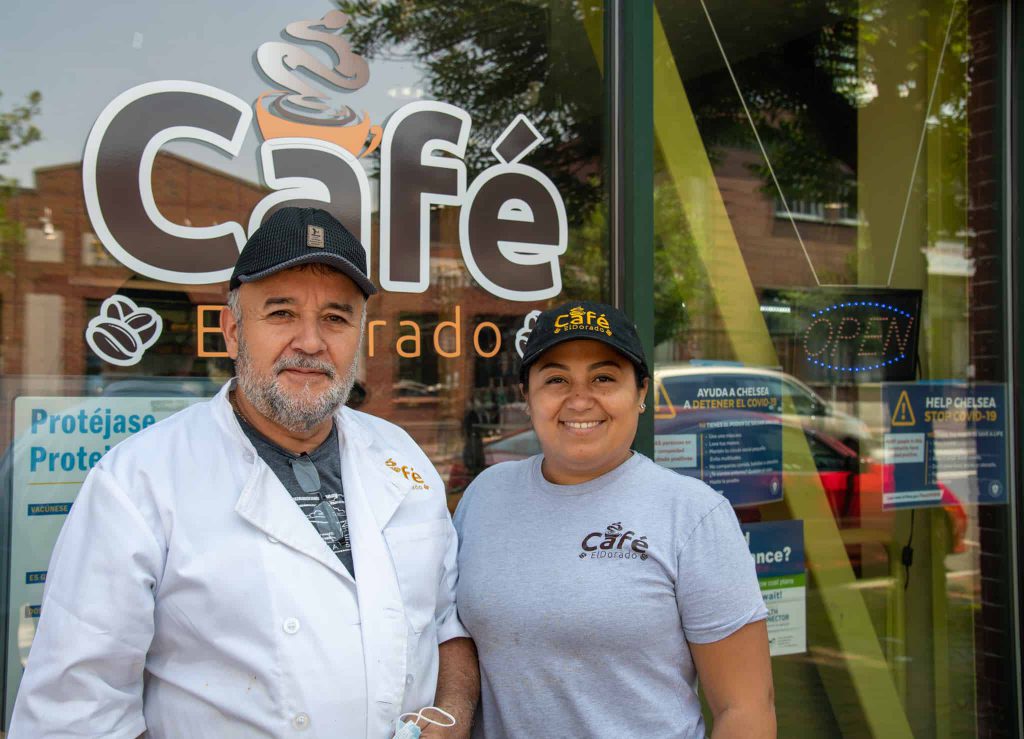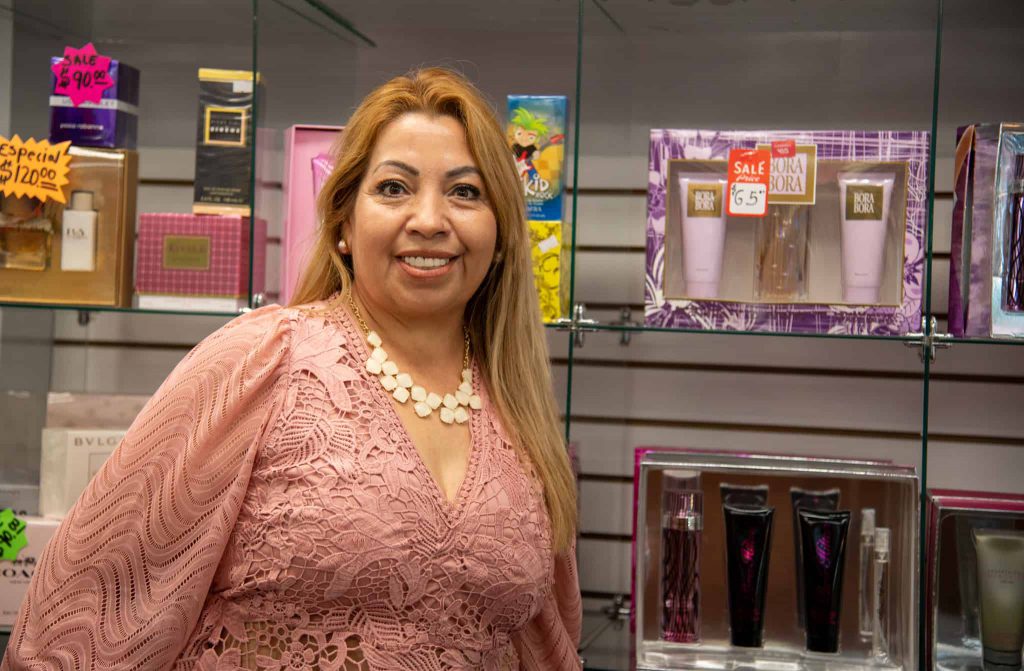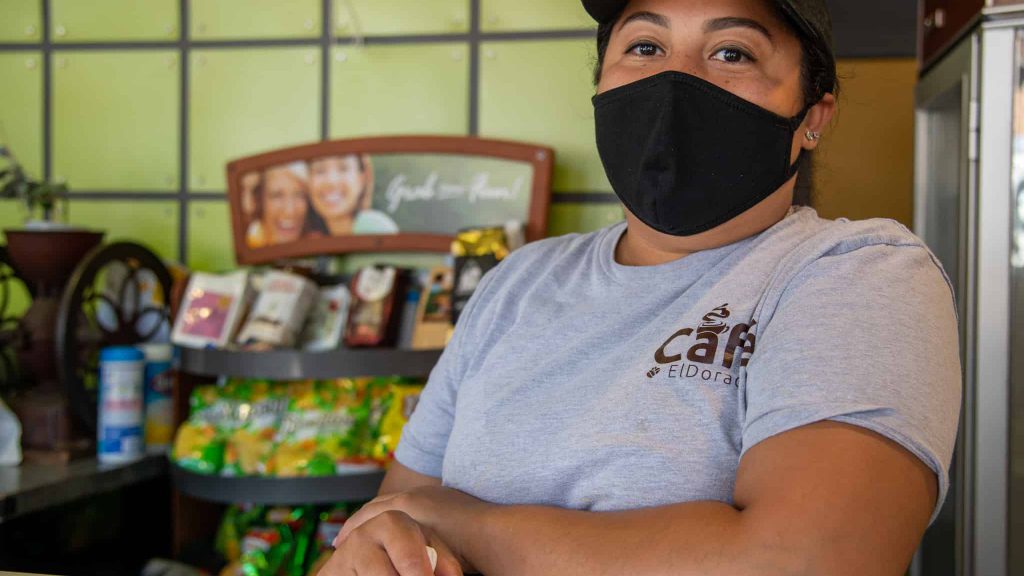Chelsea with an economy underpinned by a collection of immigrant-owned businesses was negatively impacted by the coronavirus and restrictions to government aid disproportionately affecting Hispanics-Latinos.
Jenny and Carlos Camacho planned on opening El Dorado, a small café on Chelsea’s Broadway street, as a way to pursue their passion for baking and coffee making finally. A week after they opened, they watched as Governor Charlie Baker announced a State of Emergency due to the COVID-19 pandemic.

Jenny said her business did not qualify for government funding due to it opening a week before the state of emergency. She said she applied to 12 different types of loans — including the Payment Protection Program (PPP) and Massachusetts Growth Capital Corporation — but could only receive a $500 grant from MassDevelopment.
“There was not one single [grant] that was available that I didn’t apply for,” Camacho said. “We were eligible for [Restaurant Revitalization Fund] but that was too short of a timeframe and money ran out, so we didn’t get that either.”
Many programs not available to Latino businesses
“Over at the height of the pandemic around two thousand jobs were lost completely in Chelsea, and that doesn’t factor into a reduction in hours or temporary furloughs that have subsequently come,” Alex Train, director of Housing for community development for the city of Chelsea, said. “So, the impact has really been great, from an employment perspective.”
Train said the city implemented financial assistance programs to provide direct contributions to businesses in a $1 million program funded by the Chelsea City Council. Train said that around 75 percent of the recipients of the money were minority-owned businesses.
“We’ve intentionally designed many of our economic and housing programs to act as a safety net primarily for residents that don’t qualify for state and federal assistance,” he said. “But even though [the federal and state] investments were made, many of those programs were not available to the Latino population in Chelsea, and they were definitely not available to the undocumented population in Chelsea.”
Train said the main recipients of state and federal help were affluent white businesses. In contrast, the smaller companies that have been established for a long time and are essential to the community’s fabric were seemingly left in the dark.
Karl Allen, the economic development planner at the Department of Housing in Chelsea, said that there were many factors as to why people did not have access to the funding. Still, primarily it required businesses to have an established banking relationship — something that many in the community lack.
Enter the Chelsea Business Foundation
Carlos Matos, Chief Executive Officer of the Chelsea Business Foundation, said the foundation works with small businesses to help them find their footing in the city. Matos said they helped businesses with technical assistance, such as assisting them in establishing an established online presence and connecting them with the city’s funding during the pandemic.
Matos said many hoops in place that business owners have to jump through to get their funding. He said the type of information businesses have to provide to access funding is not easily accessible.
“Some [business owners] were also caught in a catch 22: ‘Oh, you didn’t pay your taxes so we can’t give you funding well why didn’t I pay my taxes because I didn’t have money,’” he said about the type of challenges small business owners face when they try to get funding.
Matos said the Chelsea Business foundation reached out to about 700 small businesses in the area to get them in contact with the funding provided by the city, but only a few 100 were able to get access to the money during the last year.
When the City Council voted to fund the $1 million program to help businesses, Matos said the business foundation placed a bid to be the program’s administrators. He said that while many in the community are still facing tough times, the city now has increased awareness for small businesses.
“Now there is a greater focus on [small businesses] before there wasn’t a line item in the budget for them,” he said of the city council budget. “You would see lines in the budget for economic development or support before, you would see that for housing, you would see that for a bunch of stuff, but you would never see one for businesses.”
Matos said things are looking up for the business community in Chelsea than it was before COVID.
“So now the small business community is in a lot better situation than it was prior to COVID, but we help them to sustain and keep the doors open by providing them with the million dollars in funds from government and other sources and provide them with the ability to keep the doors open to pay people, and pay their rent,” he said.
Businesses are still struggling
While the city is recovering financially, many small business owners are still reeling from the pandemic — most unable to access government funding.

Noemi Velasco manages her business of La Guanaquita Boutique, a retail shop on Broadway Street in downtown Chelsea — a place she has managed for over 18 years. When the pandemic hit, she temporarily closed the store not to have to furlough any employees.
She said her business took a big financial hit, and that although she applied for financial relief, no money has come her way.
“I applied for [PPP] loans, and almost any I could see,” she said in Spanish. “Frankly, I don’t think the government knew how to allocate the money. What would have happened if I didn’t have the funds to pay my employees while we were closed? I would have had to fire them.”
Velasco said she kept a rainy day fund to pay her employees just in case of any emergencies — those funds have now dwindled. She believes the government funding was not distributed equitably due to a disconnect between local government and the city’s small businesses.
“It’s not like I just set up my business, I have been here for more than ten years,” she said. “The businesses that, in [the government’s] view, are not essential were left without any help. People still need clothing. According to [the state], we are not essential, but we pay taxes like essential businesses.”
Velasco said the virus affected her personally, as her sister died last year from complications related to COVID-19. Despite having all her employees be vaccinated, she is still trying to be as safe as she can whenever she works at the store.
“I lost a sister to COVID,” she said. “The truth is that the situation in the city was too ugly and I did not want to put my employees at risk, so I chose to close.”
Velasco said the city has changed a lot for the better since COVID initially hit last year; she donated masks and clothing to the city at the height of the pandemic. She said that while COVID infections are low compared to last year, she is wary of the number of people still hesitant about getting the vaccine.
“There’s a lot of people who don’t want to get vaccinated,” she said. “We want things to change, but we don’t want to be part of the change. If you want to see change, you need to do your part. As soon as we were eligible, I told my employees they needed to get vaccinated — so we have been for some time now.”
While many small businesses still find themselves ineligible for the help granted by the city council funding, the Chelsea Business Foundation is introducing multiple programs that could promote small businesses.
Matos said one of the programs is made in collaboration with Fair Food Network. It involves creating a market with kiosks similar to that of Faneuil Hall where businesses could rent out a cheaper spot to rent.
While Matos acknowledges that there is still a lot of work to do to help businesses like Velasco’s and the Camacho’s to get their footing in Chelsea, he said the community’s response to the business foundation has been his main motivation to keep moving forward.
“By providing support to allow these people to keep the doors open, [businesses] can keep hiring people, they can keep paying people,” he said. “And we’ve been able to do that and people now have been more engaged with us and much more truthful to be able to allow themselves to be helped.”
Publisher’s Note: The cover photo is of Jenny Camacho, who said she applied to every relief funding she knew about but was only granted $500 from MassDevelopment.
All photos were taken by Tomas Gonzalez.




